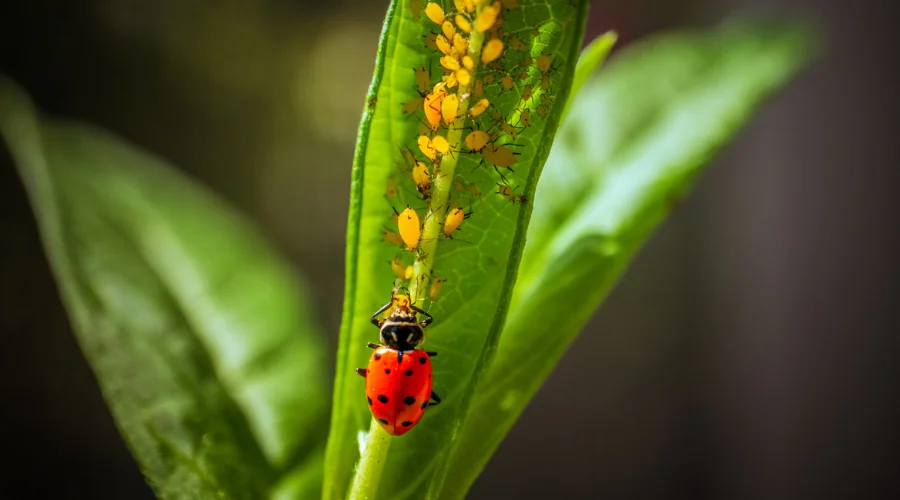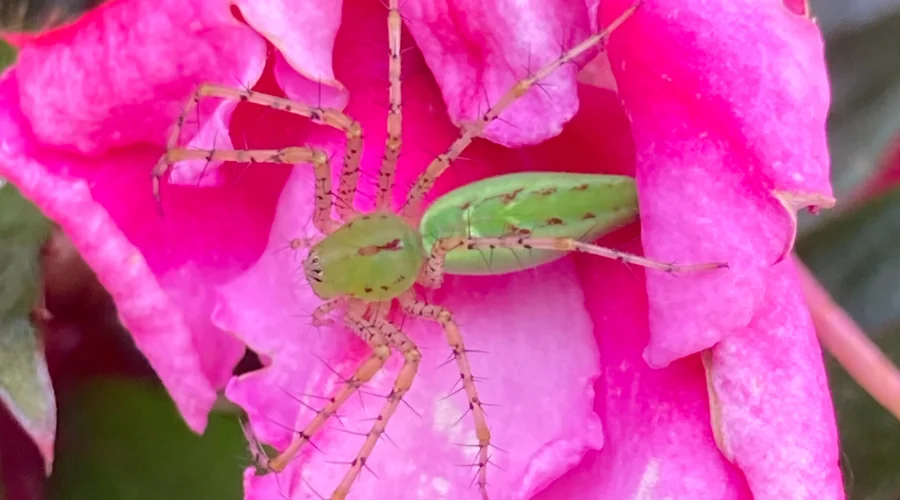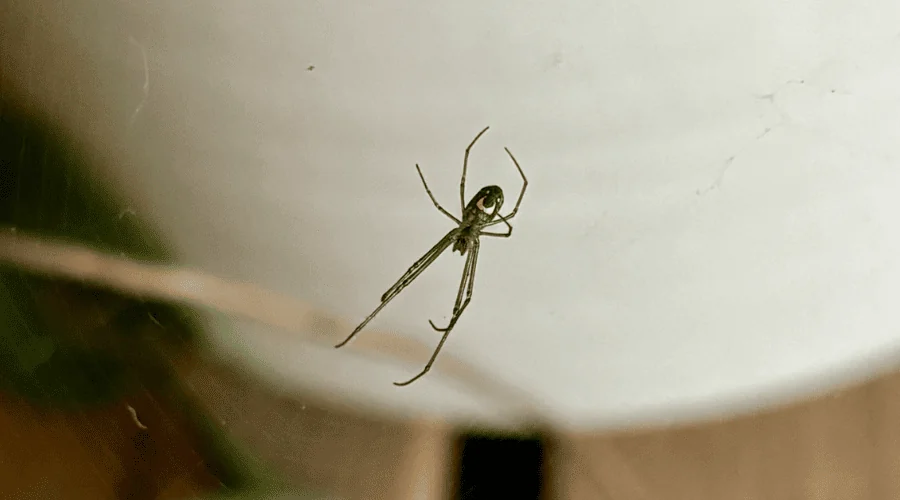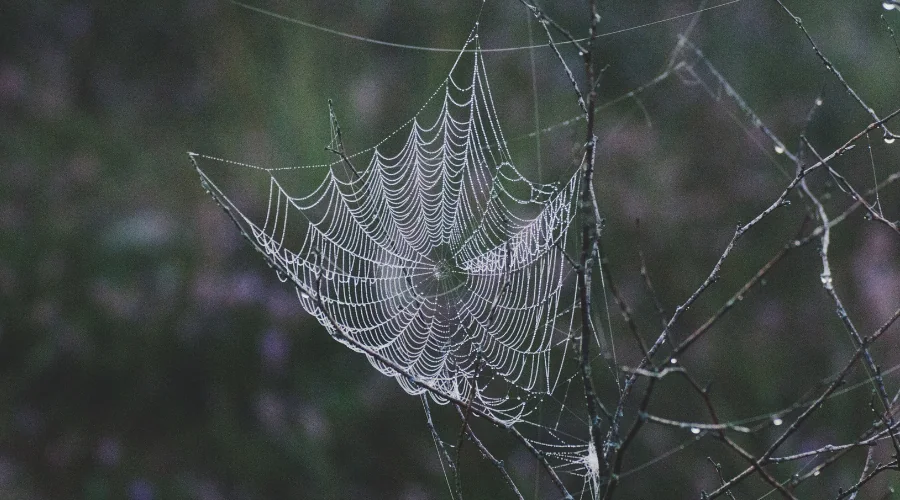The Unsung Spiders & Insects Helping Your Central Florida Garden Thrive
By Amanda Rose Newton
Winter in Central Florida isn’t exactly barren; our “mild season” still hums with quiet life. While many pests take a break, a whole cast of beneficial insects (and our favorite eight-legged friends!) step forward to keep your garden healthy.
Yes… I said spiders.
And before you scroll away, hear me out. Winter is the BEST time to appreciate them, and they’re doing far more for your plants than most people realize.
Let’s take a closer look at the winter garden helpers you should actually be thankful for.

Why You Should Be Thankful for Spiders This Winter
If I could shout one winter gardening truth from a rooftop, it would be:
Spiders are not pests. They are pest control.
In cooler months, spiders become more visible in Central Florida landscapes. They’re slower, easier to spot, and a little bolder with their webs. But this is great news, because:
1. They eat the pests overwintering in your yard
A single spider can consume hundreds of insects each season, including:
- Aphids
- Fungus gnats
- Whiteflies
- Caterpillars
- Leafhoppers
- Roaches
- Even mosquitoes, if you have sheltered areas
Think of them as tiny, free exterminators working 24/7.
2. They prevent spring pest explosions
Many damaging insects overwinter as eggs or juveniles on your plants.
Spiders are one of the few predators active in winter, reducing early spring outbreaks BEFORE you see them.
3. They’re harmless 99% of the time
Central Florida has very few medically concerning spiders, and those species actively avoid people.
The ones you see on your porch light or in your rosemary bushes?
Totally harmless. Totally helpful.
4. They’re indicators of a healthy ecosystem
If spiders feel at home in your garden, it means:
- You have plant diversity
- You’re avoiding harsh pesticides
- You have a steady supply of pollinators and natural prey
- You’re building up good soil ecology
Basically, your garden is working exactly as nature intended.

Common Garden Spiders You’ll See in Central Florida (And Why They’re All Good News)
Even if you aren’t a “spider person,” knowing who’s who makes them a lot less scary and a lot easier to appreciate. These are the species you’re most likely to spot helping your garden this winter:
Orchard Orbweaver (Leucauge venusta)
A tiny, jewel-toned spider often found in veggie beds, herb patches, and between tomato cages.
- Shimmering green, silver, and yellow body
- Builds low, delicate horizontal webs
- Excellent predator of gnats, whiteflies, and tiny moths
They’re gentle and incredibly beneficial for Florida gardens.
Spiny Orbweaver (Gasteracantha cancriformis)
Also known as spiny-backed orbweavers or “crab spiders.”
- White, red, or yellow shell-like body with cute little spikes
- Builds big circular webs between shrubs and corner posts
- Harmless and highly effective at catching mosquitoes and whiteflies
Kids love these; they look like they could be straight out of a storybook.
Golden Silk Orbweaver / Banana Spider (Trichonephila clavipes)
Large and dramatic, but not aggressive.
- Big yellow-striped body
- Strong golden web often stretched between trees
- Eats beetles, wasps, grasshoppers, and large moths
Their presence signals a thriving ecosystem.
Green Lynx Spider (Peucetia viridans)
A sleek, bright green hunter found in flower beds and on veggie plants.
- Ambush predator
- Perfect for controlling grasshoppers, leafhoppers, and caterpillars
- Females guard their egg sacs fiercely
A favorite of rose growers and veggie gardeners alike.
Jumping Spiders (Family Salticidae)
Tiny, fuzzy, curious, and surprisingly charming.
- Active hunters
- Found on fences, windowsills, and potted plants
- Eat flies, gnats, aphids, and even small roaches
One of the best indoor–outdoor pest managers.
Wolf Spiders (Family Lycosidae)
Ground-dwelling spiders are often seen on walkways or mulch.
- Fast-moving
- Not web builders
- Hunt roaches, beetles, and earwigs overnight
If you see one, it’s just patrolling for pests.
Common House Spider (Parasteatoda tepidariorum)
Frequently spotted in porch corners, garages, and sheds.
- Harmless to humans
- Consume huge numbers of flies, gnats, and mosquitoes
- Active year-round
They keep “indoor winter pests” in check better than any spray.

Other Beneficial Bugs to Appreciate This Winter
Even in winter, Florida’s gardens are buzzing, quietly but purposefully, with helpful insects doing behind-the-scenes work.
Lacewings
These delicate insects appear more often in cooler weather.
Their juvenile form, sometimes called aphid lions, devour:
- Aphids
- Whiteflies
- Thrips
- Mites
- Small caterpillars
Ladybugs (and Their Nymphs)
If they cluster on a wall or tree trunk, they’re just keeping warm.
Ladybug teenagers eat:
- Aphids
- Mites
- Mealybugs
- Scale crawlers
Ground Beetles
Seen under mulch or leaf litter, they hunt:
- Slugs
- Cutworms
- Caterpillars
- Soil-dwelling larvae
Native Bees
Some remain active in winter whenever temps rise above 60°F.
They help pollinate:
- Broccoli
- Cauliflower
- Mustard greens
- Fava beans
Winter Butterflies
Monarchs, sulfurs, and cloudless swallowtails remain active during warm spells and continue pollinating herbs and winter annuals.

How to Support Beneficial Bugs & Spiders This Season
1. Leave some leaf litter
Protects overwintering larvae, beetles, and wolf spiders.
2. Reduce pesticides
Even organic oils and soaps harm beneficial insects.
3. Plant winter herbs & flowers
Great choices: dill, cilantro, rosemary, parsley, salvia, alyssum, snapdragons.
4. Keep outdoor lighting minimal
Helps spiders hunt and keeps moths/bees from becoming confused.
5. Let webs stay when possible
A web on your porch is free mosquito control.

This holiday season, as the air cools and the garden quiets, it’s the perfect time to appreciate the creatures working silently on your behalf.
Spiders aren’t something to fear — they’re something to be grateful for.
They protect your veggies, keep your ornamentals vibrant, and maintain natural balance in your Florida yard.
So next time you see a web glistening in the morning dew or a tiny jumping spider watching you from a planter, give it a little nod.
Your garden is healthier because of them.


